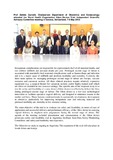World Health Organization Odon Device Trial: Independent Scientific Advisory Committee Meeting
Abstract
Intrapartum complications are responsible for approximately half of all maternal deaths, and two million stillbirth and neonatal deaths per year. Prolonged second stage of labour is associated with potentially fatal maternal complications such as haemorrhage and infection and it is a major cause of stillbirth and newborn morbidity and mortality. Currently, the three main options for managing prolonged second stage of labour are forceps, vacuum extractor and caesarean section.
All three clinical practices require relatively expensive equipment (e.g, a surgical theatre for caesarean section) and/or highly trained staff which are often not available in low resource settings. The specific aim of the proposed study is to test the safety and feasibility of a new device (Odon device) to effectively deliver the fetus during prolonged second stage of labour. The Odon device is a low-cost technological innovation to facilitate operative vaginal delivery and designed to minimize trauma to the mother and baby. These features combined make it a potentially revolutionary development in obstetrics, particularly for improving intrapartum care and reducing maternal and perinatal morbidity and mortality in low resource setting.
The main objective of the trial is to evaluate the safety and feasibility, in terms of ease of application and successful delivery and preliminary efficacy, of the Odon device in assisting vaginal delivery in singleton term pregnancies during the second stage of labour. The agenda of the meeting included presentation and demonstration of the Odon device prototype; safety and feasibility trial in Argentina; feedback from Data Safety Monitoring Committee; and safety and feasibility trial expansion.
Publisher
University of Nairobi

